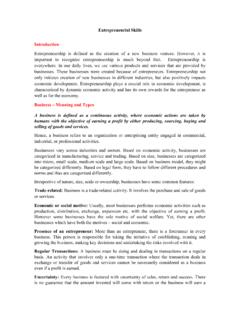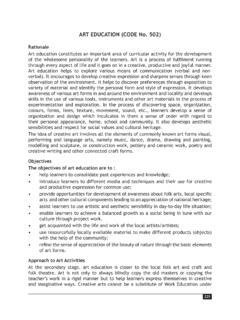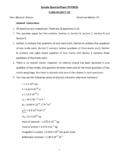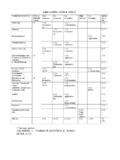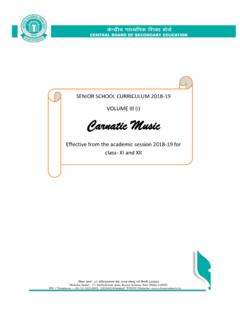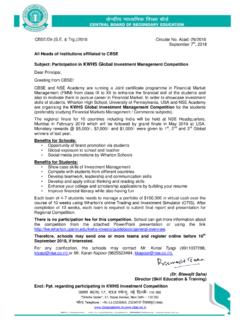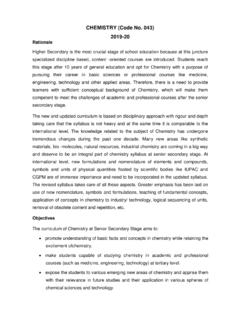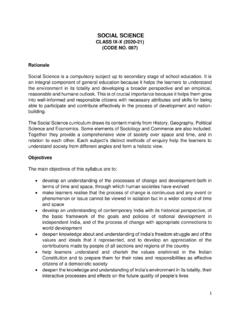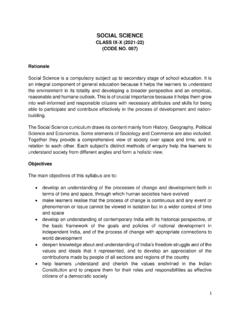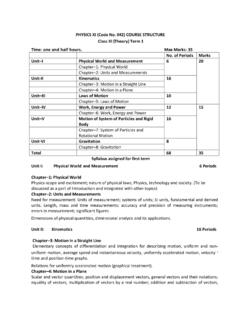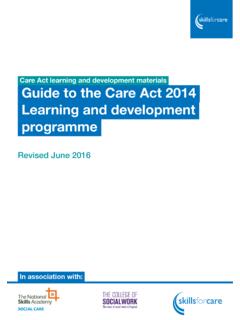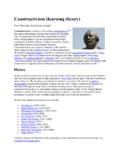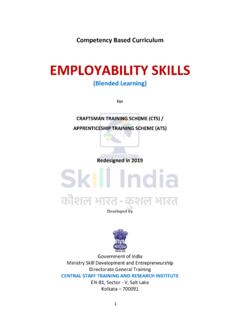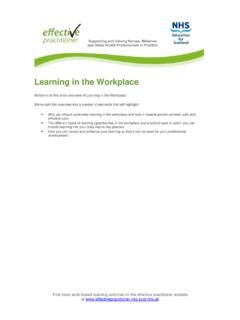Transcription of POLITICAL SCIENCE (Code No. 028) Class XI (2021-22) TERM ...
1 POLITICAL SCIENCE (Code No. 028) Class XI (2021-22) TERM WISE SYLLABUS TERM- 1 40 Marks Units Contents WEIGHTAGE (IN MARKS) Part A: Indian Constitution at Work 1 Constitution 12 2 Election and Representation 05 3 Local Government 03 Part B: POLITICAL Theory 4 POLITICAL Theory: An Introduction 07 5 Rights 07 6 Development 06 Total 40 TERM- 2 40 Marks Units Contents WEIGHTAGE (IN MARKS) Part A: Indian Constitution at Work 7 Legislature 07 8 Executive 07 9 Judiciary 06 Part B.
2 POLITICAL Theory 10 Liberty 07 11 Equality 07 12 Justice 06 Total 40 Project Work* = 20 Marks *See the guidelines given with the document. Grand Total = Term I = 40 Marks Term II = 40 Marks Project Work = 20 Marks ------------ = 100 Marks ------------ POLITICAL SCIENCE (Code No. 028) Class XII (2021-22) TERM WISE SYLLABUS TERM- 1 40 Marks TERM- 2 40 Marks Units Contents WEIGHTAGE (IN MARKS) Part A: Contemporary World Politics 7 New Centers of Power 08 8 South Asia and the Contemporary World 06 9 Globalization 06 Part B: Politics in India Since Independence 10 Parties and the Party Systems in India 06 11 Democratic Resurgence 06 12 Indian Politics: Trends and Developments 08 Total 40 Project Work* = 20 Marks *See the guidelines given with the document.
3 Grand Total = Term I = 40 Marks Term II = 40 Marks Project Work = 20 Marks ------------ = 100 Marks ------------ Units Contents WEIGHTAGE (IN MARKS) Part A: Contemporary World Politics 1 Cold War Era and Non aligned Movement 6 2 The End of Bipolarity 8 3 United Nations and its Organizations 6 Part B: Politics in India Since Independence 4 Challenges of Nation-Building 08 5 Planning and Development 04 6 India's Foreign Policy 08 Total 40 Note: Kindly refer to the guidelines on project work given below:- Guidelines for Subjects having Project Work: 20 Marks (Sociology, History, Legal Studies, POLITICAL SCIENCE , Economics, Business Studies, Accountancy) One Project to be done throughout the session, as per the existing scheme.
4 1. The objectives of the project work: Objectives of project work are to enable learners to: probe deeper into personal enquiry ,initiate action and reflect on knowledge and skills , views etc. acquired during the course of Class XI-XII . analyse and evaluate real world scenarios using theoretical constructs and arguments demonstrate the application of critical and creative thinking skills and abilities to produce an independent and extended piece of work follow up aspects in which learners have interest develop the communication skills to argue logically 2. Role of the teacher: The teacher plays a critical role in developing thinking skills of the learners. A teacher should: help each learner select the topic after detailed discussions and deliberations of the topic; play the role of a facilitator to support and monitor the project work of the learner through periodic discussions; guide the research work in terms of sources for the relevant data; ensure that students must understand the relevance and usage of primary evidence and other sources in their projects and duly acknowledge the same; ensure that the students are able to derive a conclusion from the content; cite the limitations faced during the research and give appropriate references used in doing the research work.
5 Educate learner about plagiarism and the importance of quoting the source of the information to ensure authenticity of research work. prepare the learner for the presentation of the project work. arrange a presentation of the project file. 3. Steps involved in the conduct of the project: Students may work upon the following lines as a suggested flow chart: Choose a title/topic Collection of the research material/data Organization of material/data Present material/data Analysing the material/data for conclusion Draw the relevant conclusion Presentation of the Project Work The project work can be in the form of Power Point Presentation/Exhibition/Skit /albums/files/song and dance or culture show /story telling/debate/panel discussion, paper presentation and so on.
6 Any of these activities which are suitable to visually impaired/differently-abled candidates can be performed as per the choice of the student. 4. Expected Checklist for the Project Work: Introduction of topic/title Identifying the causes, events, consequences and/or remedies Various stakeholders and effect on each of them Advantages and disadvantages of situations or issues identified Short-term and long-term implications of strategies suggested in the course of research Validity, reliability, appropriateness and relevance of data used for research work and for presentation in the project file Presentation and writing that is succinct and coherent in project file Citation of the materials referred to, in the file in footnotes, resources section, bibliography etc.
7 5. Term-Wise Assessment of Project Work: Project Work has broadly the following phases: Synopsis/ Initiation, Data Collection, Data Analysis and Interpretation, Conclusion. The aspects of the project work to be covered by students can be assessed during the two terms. 20 marks assigned for Project Work can be divided in to two terms in the following manner: TERM-I PROJECT WORK: 10 Marks The teacher will assess the progress of the project work in the term I in the following manner: Month Periodic Work Assessment Rubrics Marks 1-3 July-September Instructions about Project Guidelines, Background reading Discussions on Theme and Selection of the Final Topic, Initiation/ Synopsis Introduction, Statement of Purpose/Need and objectives of the study, Hypothesis/Research Question, Review of Literature, Presentation of Evidence, Methodology, Questionnaire, Data Collection.
8 5 4-5 October-November Planning and organisation: forming an action plan, feasibility or baseline study, Updating/modifying the action plan, Data Collection Significance and relevance of the topic; challenges encountered while conducting the research. 5 October-November Midterm Assessment by internal examiner TOTAL 10 TERM- II - PROJECT WORK: 10 Marks The teacher will assess the progress of the project work in the term II in the following manner: 6. Viva-Voce At the end of the stipulated term, each learner will present the research work in the Project File to the External and Internal examiner. The questions should be asked from the Research Work/ Project File of the learner. The Internal Examiner should ensure that the study submitted by the learner is his/her own original work.
9 In case of any doubt, authenticity should be checked and verified. ** Month Periodic Work Assessment Rubrics Marks 6-7 December-January Content/data analysis and interpretation. Conclusion, Limitations, Suggestions, Bibliography, Annexures and overall presentation of the project. Content analysis and its relevance in the current scenario. Conclusion, Limitations, Bibliography, Annexures and Overall Presentation. 5 8 January/ February Final Assessment and VIVA by both Internal and External Examiners External/ Internal Viva based on the project 5 TOTAL 10
